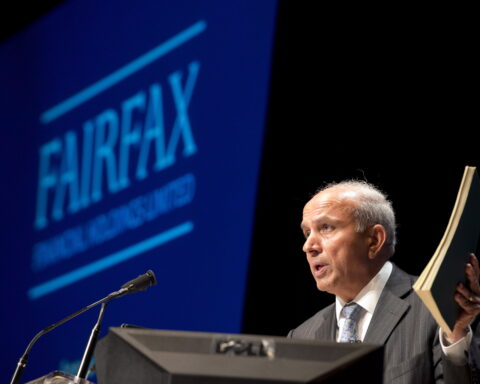Since its launch in 2006, a significant portion of the global investment industry has signed on to the United Nations–backed Principles for Responsible Investment (PRI). As of 2021, the collective assets under management represented by all PRI signatories – a group committed to incorporating environmental, social and governance (ESG) factors into their investment decisions – was more than US$121 trillion.
In October, the annual PRI in Person conference kicked off in Toronto with opening remarks from Luke Gould, the CEO of Mackenzie Investments, a Canadian leader in responsible investing and the lead sponsor of the event. “Sustainability is more than a buzz word. It is the most important progression in how we approach capital markets,” he told the gathered crowd. “Our commitment to sustainability is deeply rooted in the core values of responsibility, active ownership and transparency.”
Over the next three days, the conference convened discussions that highlighted the latest learnings, focus areas and key obstacles for the responsible investment community. Here are our top four takeaways from PRI’s 2024 conference, based on insights and conclusions from the world’s top responsible investors.
1. Sustainability disclosure is the new normal
Around the world, policies and regulations requiring companies to disclose their emissions and sustainability metrics have advanced at varying rates and to different stages of development, from barely nascent to quite mature. The European Union is leading the way with its sustainable finance taxonomy and Corporate Sustainability Reporting Directive. Meanwhile, Canada only recently released its plans to move forward with a green labelling taxonomy and a legal framework for corporate climate disclosures by major companies.
For investors, however, sustainability disclosure isn’t merely optional anymore; it’s essential. On a panel discussing Climate Engagement Canada – an initiative to foster dialogue between finance and industry for a just transition to a net-zero economy – TD Asset Management’s managing director, Priti Shokeen, said that her team now expects portfolio companies to make sustainability disclosures. Even if such disclosures are voluntary from a regulatory perspective, the information is critical for asset managers, especially now that they need to report their own portfolio emissions on ESG-labelled funds.
2. Engagement and divestment both have a role to play
The engagement versus divestment debate has been ongoing in the investor community. Since investors hold sway with companies as shareholders, the “engage” side of the camp argues that investors can more effectively push for change through active engagement. That is, by showing up to shareholder meetings and trying to steer portfolio companies toward decarbonization.
Pro-divestment groups argue that investors should sell shares in companies that operate in specific industries like oil and gas, for ethical reasons and to promote social change by making it harder for these companies and industries to raise capital. According to the Global Fossil Fuel Divestment Commitments Database, there are now 1,638 pension funds, philanthropic foundations and other groups worth more than US$40 trillion committed to fossil fuel divestment. Studies have shown that divesting really works, both to cause the stock prices of climate-damaging stocks to fall and to create additional financial value.
At the conference, it was clear that the responsible investment community has arrived at the conclusion that engagement and divestment should both be on the table, and that no one-size-fits-all approach works best for portfolio decarbonization.
“The idea that [the options are] either engage or divest is a bit of an antiquated, false dichotomy and doesn’t really reflect the reality that I have as an investor,” explained Joseph Bastien, trustee at the Wikwemikong Trust. “We buy and sell companies all the time for a variety of reasons, quite frankly.”
Investors can’t just divest from carbon-intensive industries and wipe their hands of their role in the net-zero transition, argued Deborah Ng, head of ESG and sustainability at GMO LLC. “If we don’t get real-world emission reductions, we’re not going to get to net-zero, and having a net-zero portfolio isn’t going to help,” she said.
3. Companies need transition plans that show capital-expenditure alignment with 1.5°C
It was clear at PRI in Person that investors are tired of waiting for governments to put regulations in place that will require companies to decarbonize. Carmen Velasquez, managing director for sustainable investing at Alberta Investment Management Corporation, said that her team provides specific feedback to companies on a case-by-case basis, from target-setting to scenario analysis – and that companies appreciate this.
But responding to this feedback with concrete metrics can be more challenging. For example, companies struggle to report how their capital expenditures align with a 1.5°C pathway. “There is no path to zero, so [we ask] how are you aligning capex over time?” Velasquez explained, describing how she helps companies think about sustainability reporting.
Company transition plans can help shine a light. “Disclosure defines the problem, action is required to address it,” said Mark Carney, the former governor of the Bank of Canada, during his plenary address at the conference. Reflecting on his work as a world leader in aligning finance with net-zero, Carney said that it took 10 years after the 2015 Paris Agreement for climate disclosure to become mainstream – and we can’t wait 10 more years for disclosures to be incorporated into plans for reducing emissions.
RELATED
Canada’s new sustainable finance rules don’t go far enough
Death of ESG is greatly exaggerated, say pension managers
“Governments should act now by adopting consistent and comparable taxonomies and mandating transition plans for large companies and financial institutions,” Carney said to a round of applause from the 2,000-person crowd. “Plan beats no plan. We are in a climate crisis. You need a plan to get out of it.”
4. Responsible investors must take a balanced and cautious approach to AI
“Can You Invest Responsibly in AI?” was the title of one of the final panels at PRI and a frequent topic of conversation among conference attendees.
There is a trifecta between AI, power demand and the need to decarbonize, said Kirsty Jenkinson, investment director at California State Teachers’ Retirement System. AI is going to present a considerable barrier to achieving net-zero goals, she explained, because of the exponential electricity demand required by the “hyperscalers” (the data centres and cloud computing companies that support modern AI).
On the other hand, AI could heighten and accelerate some of the shifts we need, such as in electricity-transmission bottlenecks. “Hyperscalers are paying massive premiums right now for carbon-free baseload power, [which] is creating opportunities for geothermal and other forms of [renewable] energy,” Jenkinson pointed out.
So how should investors evaluate companies’ use of AI from an ESG perspective? From ethics to privacy, cyber security, human rights and emissions, there are many overlapping ESG considerations that investors and companies need to consider to ensure that AI is being used responsibly.
It’s important for companies to include tech-literate people on their boards who are capable of judging whether it’s properly under control, advised Canadian AI expert Cameron Schuler, chief commercialization officer and vice president of industry innovation at the Vector Institute. Often corporate governance is the least frequently discussed pillar of the ESG framework, but the rise of AI means that responsible investors will need to take a closer look at how company executives are managing the risks it presents.
Jessica Carradine is project lead on Corporate Knights’ Climate Dollars initiative.







